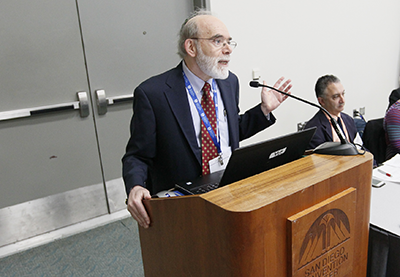Session on Goldwater Rule Elicits Diverse Reactions From Participants

“The Goldwater Rule is a masterpiece of contradictions,” said Jerrold Post, M.D., in summarizing the multiplicity of views about Section 7.3 of APA’s Principles of Medical Ethics With Annotations Especially Applicable to Psychiatry that were evident in an Annual Meeting session on Sunday.
“The Goldwater Rule is a valuable component of the ethics of psychiatry,” asserted former APA President Paul Appelbaum, M.D. (pictured above). Appelbaum is the Dollard Professor of Psychiatry, Medicine, and Law at Columbia University College of Physicians and Surgeons and a member of APA’s Committee on Judicial Action.
“The Goldwater Rule is more a guideline for etiquette than an enforceable moral dictum,” said Claire Pouncey, M.D., Ph.D., a private practitioner in Philadelphia. “When the Goldwater Rule functions as a gag rule, it is in itself unethical.”
The Goldwater Rule, the popular name for Section 7.3, was developed after a number of psychiatrists declared during the 1964 presidential election that Sen. Barry Goldwater, the Republican candidate, was “psychologically unfit” to be president. The episode called into question the scientific grounding and the trustworthiness of the psychiatric profession, said Appelbaum.
Section 7.3 says that psychiatrists should not offer a “professional opinion” about a public figure without a face-to-face examination and obtaining that person’s consent. The annotation was intended to protect the integrity of the profession, protect the subject of the statement from harm, and avoid discouraging potential patients from seeking treatment and undermining people’s perception of the psychiatric profession.
Post said he practices what is now an accepted exception to Section 7.3: extended analyses of world leaders, a task he performed for the Central Intelligence Agency for 20 years. He believes he has something to offer in the present political climate but has declined media requests for comment in deference to APA’s official position. The ethics principle is “extreme and overdrawn,” he said. “Bad cases make bad law and, to some degree, that’s what happened here. APA should reconsider its position.”
A code of ethics is part of what elevates an occupation to a profession, said Pouncey. “The Goldwater Rule makes a good guideline or rule of thumb to remind psychiatrists of our shared professional standards,” said Pouncey. “But it denies a full moral role for psychiatrists by preventing the possibility of grappling with and justifying our own moral values and choices.”
Section 7.3 was never intended to take away moral agency from psychiatrists, said Allen Dyer, M.D., Ph.D., a professor of psychiatry at George Washington University who served on APA’s Ethics Committee when it first constructed the statement in 1973. “It’s not a rule; it’s a caveat.”
Stigma of varied kinds plays a role as well, said Nassir Ghaemi, M.D., a professor of psychiatry at Tufts University School of Medicine.
“Political candidates have medical evaluations but not psychiatric examinations because of the assumption that a psychiatric condition is bad,” said Ghaemi. The implication of the Goldwater Rule is that even psychiatrists think it’s bad to be diagnosed with a psychiatric disorder. Some diagnoses might even be helpful. In some cases, depression could confer a sense of realism, and hypomania may spur creativity. “The real question we should ask is, What psychological traits make for good leaders once they come into office?”
Former APA President Paul Summergrad, M.D., a professor of psychiatry at Tufts University, served as the discussant on the panel and observed that while physicians have the same right to free speech as other citizens, they gain authority but are also constrained by the role of their profession.
“Decisions made in a democracy, whether we like them or not, must be dealt with great seriousness and a sense of gravity, including commentary about public figures,” he said. “We must be circumspect.”
(Image: David Hathcox)
|
|
|
|
|


